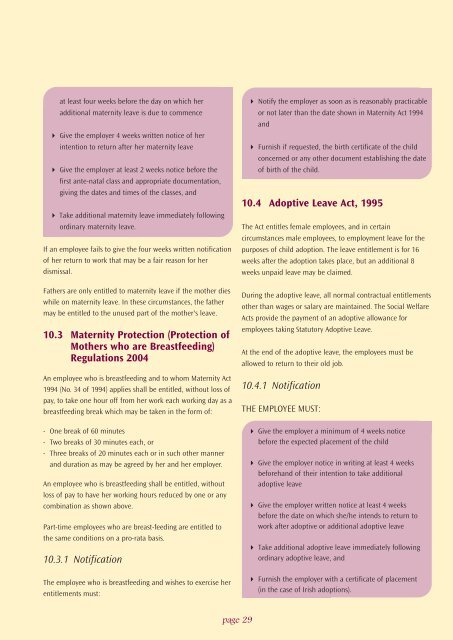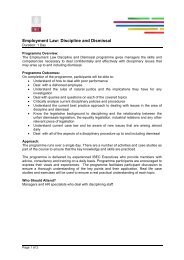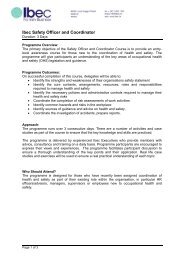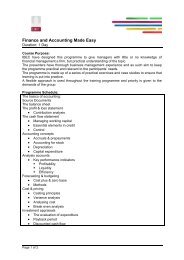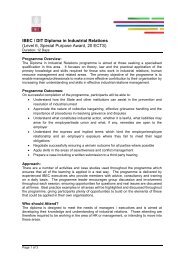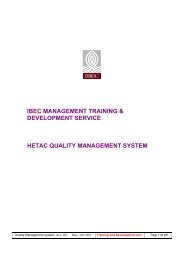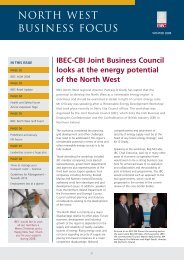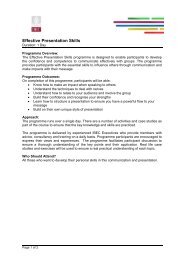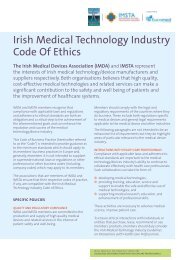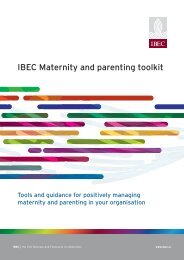Image Border - Irish Business and employers confederation
Image Border - Irish Business and employers confederation
Image Border - Irish Business and employers confederation
Create successful ePaper yourself
Turn your PDF publications into a flip-book with our unique Google optimized e-Paper software.
at least four weeks before the day on which her<br />
additional maternity leave is due to commence<br />
Give the employer 4 weeks written notice of her<br />
intention to return after her maternity leave<br />
Give the employer at least 2 weeks notice before the<br />
first ante-natal class <strong>and</strong> appropriate documentation,<br />
giving the dates <strong>and</strong> times of the classes, <strong>and</strong><br />
Take additional maternity leave immediately following<br />
ordinary maternity leave.<br />
If an employee fails to give the four weeks written notification<br />
of her return to work that may be a fair reason for her<br />
dismissal.<br />
Fathers are only entitled to maternity leave if the mother dies<br />
while on maternity leave. In these circumstances, the father<br />
may be entitled to the unused part of the mother's leave.<br />
10.3 Maternity Protection (Protection of<br />
Mothers who are Breastfeeding)<br />
Regulations 2004<br />
An employee who is breastfeeding <strong>and</strong> to whom Maternity Act<br />
1994 (No. 34 of 1994) applies shall be entitled, without loss of<br />
pay, to take one hour off from her work each working day as a<br />
breastfeeding break which may be taken in the form of:<br />
- One break of 60 minutes<br />
- Two breaks of 30 minutes each, or<br />
- Three breaks of 20 minutes each or in such other manner<br />
<strong>and</strong> duration as may be agreed by her <strong>and</strong> her employer.<br />
An employee who is breastfeeding shall be entitled, without<br />
loss of pay to have her working hours reduced by one or any<br />
combination as shown above.<br />
Part-time employees who are breast-feeding are entitled to<br />
the same conditions on a pro-rata basis.<br />
10.3.1 Notification<br />
The employee who is breastfeeding <strong>and</strong> wishes to exercise her<br />
entitlements must:<br />
Notify the employer as soon as is reasonably practicable<br />
or not later than the date shown in Maternity Act 1994<br />
<strong>and</strong><br />
Furnish if requested, the birth certificate of the child<br />
concerned or any other document establishing the date<br />
of birth of the child.<br />
10.4 Adoptive Leave Act, 1995<br />
The Act entitles female employees, <strong>and</strong> in certain<br />
circumstances male employees, to employment leave for the<br />
purposes of child adoption. The leave entitlement is for 16<br />
weeks after the adoption takes place, but an additional 8<br />
weeks unpaid leave may be claimed.<br />
During the adoptive leave, all normal contractual entitlements<br />
other than wages or salary are maintained. The Social Welfare<br />
Acts provide the payment of an adoptive allowance for<br />
employees taking Statutory Adoptive Leave.<br />
At the end of the adoptive leave, the employees must be<br />
allowed to return to their old job.<br />
10.4.1 Notification<br />
THE EMPLOYEE MUST:<br />
Give the employer a minimum of 4 weeks notice<br />
before the expected placement of the child<br />
Give the employer notice in writing at least 4 weeks<br />
beforeh<strong>and</strong> of their intention to take additional<br />
adoptive leave<br />
Give the employer written notice at least 4 weeks<br />
before the date on which she/he intends to return to<br />
work after adoptive or additional adoptive leave<br />
Take additional adoptive leave immediately following<br />
ordinary adoptive leave, <strong>and</strong><br />
Furnish the employer with a certificate of placement<br />
(in the case of <strong>Irish</strong> adoptions).<br />
page 29


